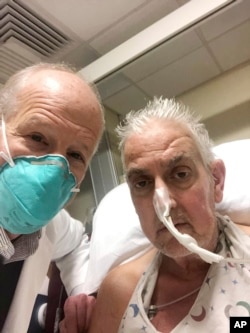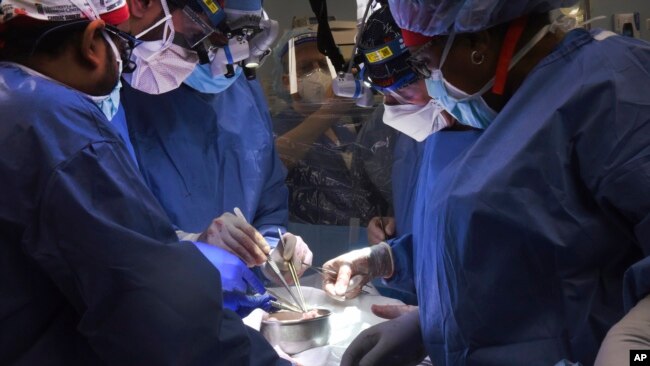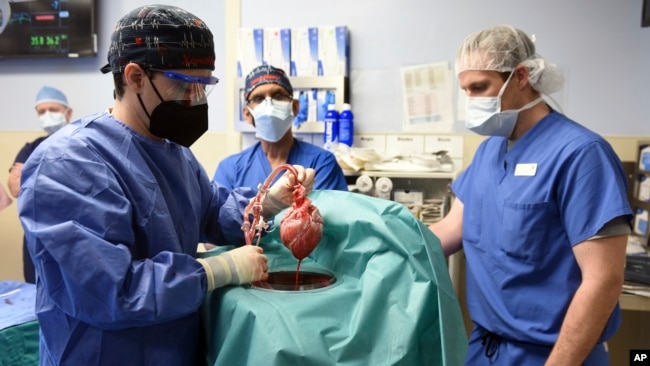豚の心臓を人に移植
驚きのニュースが舞い込んできました。
病に苦しむ人々への明かりが見えてきました。
VOAで英語を学び、世界を見つめましょう!!
豚の心臓をヒトに移植することに成功(和訳)
Doctors Successfully Transplant Pig Heart into Human Patient
3 hours ago
アメリカの医師が、豚の心臓を人間の患者に移植することに成功したと発表しました。この種の手術としては初めてのことです。
この手術は、ボルチモアにあるメリーランド大学医学部の医療チームが行いました。
このチームは月曜日に、57歳の患者、デビッド・ベネットさんがブタの心臓を受け取ってから3日後に順調に回復していると報告しました。ベネット氏の医師は、新しい心臓を助けるために人工心肺装置につながれたまま、自分で呼吸をしているといいます。
医師は、今後数週間はベネットさんが新しい臓器をどのように使うか、また彼の体が拒絶反応を起こさないかどうかを見るための重要な期間であると言います。しかし、この手術は、動物の臓器を人間の救命移植に利用する方法を探る長年の研究の新しいステップを示すものです。

In this photo provided by the University of Maryland School of Medicine, Dr. Bartley Griffith takes a selfie photo with patient David Bennett in Baltimore in January 2022. (Dr. Bartley Griffith/University of Maryland School of Medicine via AP)メリーランド大学医学部提供の写真で、2022年1月にボルチモアで患者のデビッド・ベネットと自撮り写真を撮るバートリー・グリフィス博士。(Dr. Bartley Griffith/University of Maryland School of Medicine via AP)
ベネットさんの息子によると、父親の心臓は機能不全に陥っており、人間の心臓移植の認可が下りなかったといいます。そこで、うまくいく保証がないことを知りつつも、実験的な手術に同意したのだといいます。
ベネットさんは手術の前日、医療センターを通じて声明を発表しました。その中で、彼はこう言っています。:「死ぬか、この移植をやるか、どちらかでした。私は生きたい。一か八かですが、これが最後の選択です。 」と述べています。A shot in the darkとは、少ない証拠や情報に基づく推測のことです。
過去の豚から人への移植の試みは、遺伝子の違いから臓器拒絶反応を起こして失敗しています。今回はそのリスクを減らすために、科学者たちはドナーのブタから臓器拒絶反応に関係するいくつかの遺伝子を取り除きました。また、豚の心臓の組織が大きくなりすぎるのを防ぐために、別の遺伝子も取り除きました。
ベネットの遺伝子組換え豚心臓は、バージニア州ブラックスバーグに本社を置く再生医療企業リバイバー社から提供されたものです。手術当日の朝、移植チームはブタの心臓を取り出し、特殊な装置に入れ、手術まで稼動させたままにしておきました。
この移植は、同大学が12月31日に米国食品医薬品局から緊急承認を得て許可されたものです。このような承認は、生命を脅かす状態にある患者が、他の治療法の可能性がない場合に与えられることがあります。
手術はバートリー・グリフィス博士が指揮を執りました。臓器不足の危機の解決に一歩近づいた "ブレークスルー "だといいます。

In this photo provided by the University of Maryland School of Medicine, members of the surgical team perform the transplant of a pig heart into patient David Bennett in Baltimore on Friday, Jan. 7, 2022. (Mark Teske/University of Maryland School of Medicine)メリーランド大学医学部提供の写真で、2022年1月7日金曜日、ボルチモアの患者デイビッド・ベネットに豚の心臓の移植を行う外科チームのメンバーたち。(Mark Teske/University of Maryland School of Medicine)。
さらに、「潜在的なレシピエントの長いリストを満たすために利用できるドナーのヒトの心臓は単純に十分ではありません。」と付け加えました。
臓器提供団体は、現在、臓器移植を待っているアメリカ人は約11万人いると推定しています。organdonor.govによれば、毎年6,000人以上の患者が臓器移植を受ける前に死亡しているといいます。
ムハマド・モヒディン博士は、メリーランド大学の動物から人への移植プログラムの科学的なディレクターです。モヒディン博士は、「これがうまくいけば、苦しんでいる患者のために、これらの臓器が無限に供給されることになります。」 と語っています。
Doctors Successfully Transplant Pig Heart into Human Patient
American doctors say they have successfully transplanted a pig heart into a human patient. It is the first such operation of its kind.
A medical team at the University of Maryland School of Medicine in Baltimore performed the operation.
The team reported Monday that the 57-year-old patient, David Bennett, was recovering well three days after receiving the pig heart. Bennett’s doctors said he was breathing on his own while still connected to a heart-lung machine to help his new heart.
Doctors say the next few weeks will be a critical to see how Bennett does with the new organ and whether his body begins to reject it. But the operation marks a new step in years of research to find ways to use animal organs for life-saving transplants for humans.
Bennett’s son said his father’s heart was failing and he had not been able to get approved for a human heart transplant. So, he agreed to the experimental operation even though he knew there was no guarantee that it would work.
Bennett released a statement through the medical center the day before the operation. In it, he said: “It was either die or do this transplant. I want to live. I know it’s a shot in the dark, but it’s my last choice.” A shot in the dark is a guess that is based on little evidence or information.
Past attempts at pig-to-human transplants have failed because of genetic differences that caused organ rejection. To reduce the risk of that happening in this case, scientists removed several genes from the donor pig that are linked with organ rejection. They also removed another gene from the animal in an effort to prevent too much growth of pig heart tissue.
Bennett's genetically modified pig heart was provided by Revivicor, a regenerative medicine company based in Blacksburg, Virginia. On the morning of the surgery, the transplant team removed the pig's heart and placed it into a special device to keep it running until the operation.
The transplant was permitted after the university received emergency approval from the U.S. Food and Drug Administration on December 31. Such approvals are sometimes given when a patient with a life-threatening condition has no other treatment possibilities.
Dr. Bartley Griffith led the operation. He called it a “breakthrough” that had brought research “one step closer to solving the organ shortage crisis.”
He added, “There are simply not enough donor human hearts available to meet the long list of potential recipients.”
Organ donor organizations estimate there are about 110,000 Americans currently waiting for an organ transplant. More than 6,000 patients die each year before getting one, reports organdonor.gov.
Dr. Muhammad Mohiuddin is the scientific director at the Maryland university's animal-to-human transplant program. Mohiuddin said, “If this works, there will be an endless supply of these organs for patients who are suffering.”
Words in This Story
transplant – v. to perform a medical operation in which an organ or other part that has been removed from the body of one person is put into the body of another person
modify – v. to change something in order to improve it
regenerative – adj. relating to something growing or being grown again
breakthrough – n. an important discovery
potential – adj. possible when the necessary conditions exist
